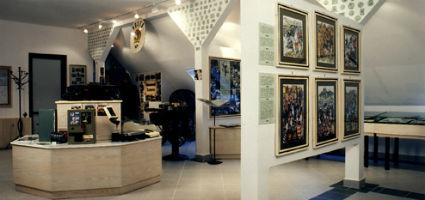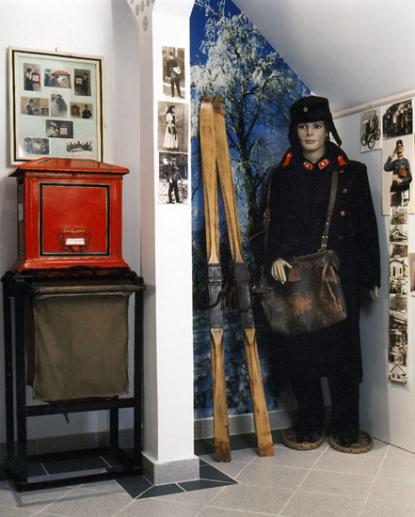2024. November 23. Saturday
Post-horn Gallery - Miskolc
 |
Address: 3525, Miskolc Kazinczy Ferenc u. 16.
Phone number: (20) 979-5487, (30) 814-0346
E-mail: info@postamuzeum.hu
Opening hours: On prior notice! (Tel.: 06-20/9795487)
|
Museum tickets, service costs:
|
Ticket for adults
|
750 HUF
|
|
|
Group ticket for adults
(11-20 people)
|
7500 HUF
|
|
|
Ticket for students
|
375 HUF
|
|
|
Group ticket for children
(11-30 people)
|
3750 HUF
|
|
|
Ticket for pensioners
|
375 HUF
|
|
|
Ticket for families
|
1500 HUF
|
/ family
|
The exhibition ward of the Postakürt Gallery was created on the attic of the management of the Miskolc Branch of the Hungarian Post with the help of the Post Museum.

The visitors can see the reproductions of the gobelins by Kapros Kósa Edit when entering. The gobelins show periods of Hungarian telecommunication. Documents and objects concerning the local post follow this part.
First, the visitors may see the memories of the military post of Rákóczi Ferenc II. The next chapter shows the history of Miskolc from the 18th century until the Settlement of '67. The first post office opened in Miskolc in September 1790 managed by Bakos László.
At the time of the reformation age, Miskolc became the cultural and economic center of the region. At the time of the Revolution 1848, the post was taken over by the Hungarians, but after the Revolution failed the Austrian regulations was used in the Hungarian post offices. The first telegraph began to operate in Miskolc in 1859.
A new period began with the Settlement of '67. The Hungarian Post became independent. The Treasury operated the post in Miskolc in 1970 where the caretaker was Bene Károly. With the development of railways, Miskolc was included in the national moving post net.
After Trianon, Hungary lost the Bratislava, Kosice, Oradea, Kolozsvár and Temesvár branches. Because Upper Hungary was detached from Hungary, the staff of the post offices of those regions moved to Hungary in January 1919. The management was relegated and was attached to the Debrecen management in 1925. In 1950, the management in Miskolc regained its position.
The next ward of the exhibition presents a little post office from the beginning of the century. The furnishing were moved from the management to the Gallery. We show a few of the machines used in the post offices. The poles have the marks of stamps on them. The last part of the exhibition presents personal documents and objects of the workers in showcases. The work of Dr. Kamody Miklós is honored on a separate pageant.

The visitors can see the reproductions of the gobelins by Kapros Kósa Edit when entering. The gobelins show periods of Hungarian telecommunication. Documents and objects concerning the local post follow this part.
First, the visitors may see the memories of the military post of Rákóczi Ferenc II. The next chapter shows the history of Miskolc from the 18th century until the Settlement of '67. The first post office opened in Miskolc in September 1790 managed by Bakos László.
At the time of the reformation age, Miskolc became the cultural and economic center of the region. At the time of the Revolution 1848, the post was taken over by the Hungarians, but after the Revolution failed the Austrian regulations was used in the Hungarian post offices. The first telegraph began to operate in Miskolc in 1859.
A new period began with the Settlement of '67. The Hungarian Post became independent. The Treasury operated the post in Miskolc in 1970 where the caretaker was Bene Károly. With the development of railways, Miskolc was included in the national moving post net.
After Trianon, Hungary lost the Bratislava, Kosice, Oradea, Kolozsvár and Temesvár branches. Because Upper Hungary was detached from Hungary, the staff of the post offices of those regions moved to Hungary in January 1919. The management was relegated and was attached to the Debrecen management in 1925. In 1950, the management in Miskolc regained its position.
The next ward of the exhibition presents a little post office from the beginning of the century. The furnishing were moved from the management to the Gallery. We show a few of the machines used in the post offices. The poles have the marks of stamps on them. The last part of the exhibition presents personal documents and objects of the workers in showcases. The work of Dr. Kamody Miklós is honored on a separate pageant.
